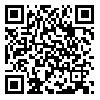Volume 4, Issue 12 (9-2015)
2015, 4(12): 11-21 |
Back to browse issues page
Download citation:
BibTeX | RIS | EndNote | Medlars | ProCite | Reference Manager | RefWorks
Send citation to:



BibTeX | RIS | EndNote | Medlars | ProCite | Reference Manager | RefWorks
Send citation to:
Nouri Z, Zobeiri M, Feghhi J, Marvie Mohadjer M R. Application of Nearest Neighbor Indices in Studying Structure of the Unlogged Beech (Fagus Orientalis Lipsky) Forests in Kheyrud, Nowshahr. Iranian Journal of Applied Ecology 2015; 4 (12) :11-21
URL: http://ijae.iut.ac.ir/article-1-668-en.html
URL: http://ijae.iut.ac.ir/article-1-668-en.html
College of Natur. Resour., Univ.of Tehran, Tehran, Iran.
Abstract: (12296 Views)
The quantitative description of forest structure can be regarded as one of the most usable working tools in modern forest management.The study aims at analyzing the stand structure in unlogged beech forests using nearest neighbor indices. Data collection was done in compartment 319 with an area about 48 ha in Educational and Experimental Forests of University of Tehran. Species and DBH of all trees with DBH > 7.5 cm were recorded. The location of each tree species was determined using azimuth and distance method in order to map tree positions. The nearest neighbor indices including Clark and Evans’s index, species mingling’s index (DMi), Relative mingling index (S) and diameter differentiation index (Tij) were then calculated using Crancod ver. 1.3 software. Using Clark and Evans’ index, the spatial pattern of trees in the study area was determined as clustered. The value of mingling index (0.31) indicated low mingling of species in these forests. The mean value of Tij (0.43) indicates moderate differentiation of trees regarding DBH, whereas S index (0.44) which is greater than 0 implies species separation in the study area. This research emphasizes the application of nearest neighbor indices in studying the beech stands structure.
Keywords: Clark and Evans index, Species mingling index, Diameter differentiation index, Hyrcannian forest, Kheyrud forest.
Send email to the article author
| Rights and permissions | |
 | This work is licensed under a Creative Commons Attribution-NonCommercial 4.0 International License. |







